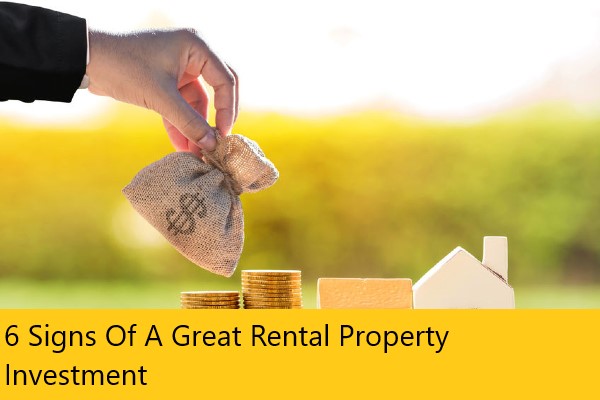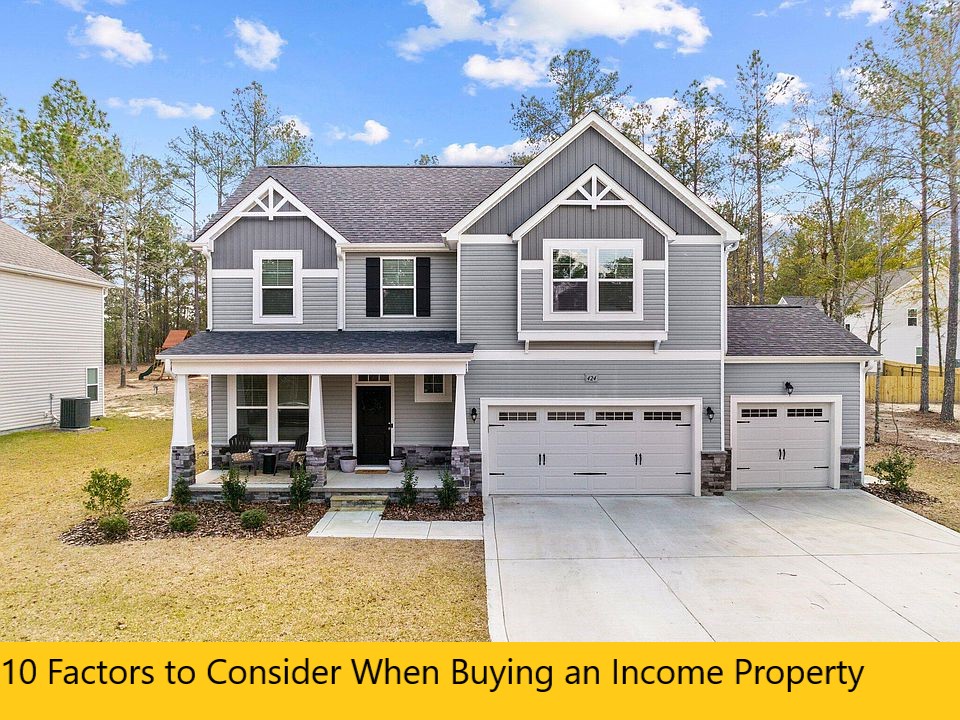6 Signs Of A Great Rental Property Investment
6 Signs Of A Great Rental Property Investment – What are the most important factors to consider when looking for the perfect rental property investment?
Investing in rental property successfully, not unlike your standard flip, is contingent on several factors. In this case, the sum really is equal to all the parts, as everything needs to fall into place for a rental property investment to reward investors. Some rental property investors allow themselves to be frozen by “analysis paralysis” and never get deals done. At the very least, they end up paying a lot more than they need to. For one reason or another, “green” rental investors are confused by all of the numbers that come up in a deal. So what are the most important factors when picking rental properties that will actually be profitable? Perhaps even more importantly, how can you make sure investing in rental property is lucrative for your business? What makes a good rental property, and how can you make sure you see the signs?
What Makes A Good Rental Property?
Although there is no singular definition for what makes a good rental property, there are several indicators and benchmarks that you can help indicate a property that would be a great add to your investment portfolio. Here are several indicators to take into consideration:
- Location
- Cash Flow & Growth Potential
- Property Condition
- Property Management
- Property Value
- Market Trends
Location
Don’t consider investing in a rental property if you aren’t going to put any thought into where it will be. It is said that location is the most important factor in acquiring a good real estate deal, which is absolutely true. However, the best time to get into a certain location can definitely change, as markets are constantly in flux. National real estate may represent the overall tone, but it’s all about locale. Here are a few key factors to keep in mind when choosing the right location for your rental property investment:
-
- Neighborhood:The neighborhood you choose for your rental property investment also determines what types of tenants will be attracted to your property as well as your vacancy rate. For example, purchasing a property near a college will mean a large portion of your potential tenants will most likely be students. In terms of vacancy rates, you may find it difficult to find tenants during the months when school is not in session. It is also important to note that some neighborhoods will discourage you from purchasing a property for rental conversions by imposing unreasonably high permit fees and other rules and regulations. Be sure to do as much neighborhood research as you can before investing in your rental property.
-
- Schools:If you are planning in investing in family-sized homes, it is highly recommended to consider the quality of the local school district. Schools will affect the overall value of your rental property investment which comes into play when you eventually decide to sell.
-
- Taxes: Depending on the area you want to invest in, property taxes can vary widely. You will want to research how much money you will be losing to taxes for any rental property investment. High property taxes may not always be a problem if you can acquire a property with long-term tenants in a higher quality neighborhood. To find tax information, you can talk to homeowners in the neighborhood or go to the municipality’s assessment office which will have any tax information you need on file. Learn the current tax rate and if it is likely to increase in the future.
-
- Crime: No renter wants to live on a property near criminal activity. Be sure to find accurate crime statistics for your target neighborhood from the local police or public library. Consider the rates of vandalism and other serious or petty crimes. Also, take note if criminal activity is on the rise or declining and if police are frequently in the neighborhood.
Picking the right cities, neighborhoods and even lots makes a difference. What is your timeline for holding the property? Will you self-manage or have professional property management on hand to deliver superior returns and generate truly passive income?
Cash Flow & Growth Potential
Cash flow is one of the most important factors to consider when investing in a rental property. If there is no cash flow, why does it make a good income property investment? What guarantees are there of future income, or even finding a renter at all? How long will it take to get a property in a “rentable” condition? At the very least, if the property doesn’t already have cash flowing, look into a professional property management company. A good third party management company is worth their weight in gold. Much of the rest, including location, may not matter much without cash flow. It is important to get a handle on the future growth potential and where real estate values are headed. Where will they be when you plan to sell, or at crucial moments when you may want to tap equity for big-ticket items? Be conservative, but hope for the best.
Property Condition
Property condition is where most real estate investors sabotage themselves. New property investors all too frequently underestimate how property condition can impact their investments. Of course, some also allow themselves to be scared off investing in otherwise awesome property investments. For example; no matter how ugly the house, great value can often easily be found in cosmetic improvements, and even in some homes with foundation issues or that have termite damage. Will it take $5,000 and four days to get a property completed and rented, or $150,000 and six months? Will the property need to be torn down at a cost of tens of thousands of dollars and rebuilt?
Just as important is the ongoing property maintenance and costs. Depending on age, quality of the building, and other factors, how much will need to be set aside for capital reserves each month and year? How does this compare to other investment property options? How will it impact the intensity of property management needs?
Property Management
Perhaps even more important than the property itself is the management. Any opportunity is only as good as the execution. An ugly house in a deeply depressed area can yield amazing returns with good management. On the other hand, even the best home in the nicest neighborhood might deliver horrific results with poor management. Who can bring the expertise to manage your property for superior returns? It’s wise to have your property manager identified ahead of making an acquisition than scrambling after the fact.
Property Value
Property value is important. Of particular importance, however, is the value of the property compared to what you are paying for it. Income investors clearly have different priorities to other types of investors. They might not need the bargain basement discounts of wholesalers. They need good income-producing properties that will have enough equity to liquidate on their timeline. Appreciation is good, and it may not make sense to buy brand new pre-construction, but cash flow rules and speculation on future value comes second. Also recognize how valuations are changing in many areas, and are being based on the income potential of a property.

Market Trends
What do area trends predict for the future performance of this property? What new developments are coming? What revitalization efforts are being made? How are the fundamentals likely to change? Is the population growing? What about jobs and wages? Who will live here 20 years from now? Here are a few key market trends to consider for your rental property:
Read More : Mypass-a-grille.com
-
- Future Development: Consult the municipal planning department for information on developments or planned developments that have already been zoned into the area. The more construction happening, the more growth is happening. Consider any new developments that could potentially hurt the price of any properties in the local area. Any plans for new properties should be considered as potential competitors for your rental property investment.
-
- Job Market: Locations with several new employment opportunities are bound to attract more tenants. Before deciding where to invest in a rental property, consult the U.S. Bureau of Labor Statistics (BLS) for job availability rates in certain areas.
-
- Average Rent: It goes without saying that the amount of rental income will be a key factor in deciding which property to invest in. Taking a look at the average rental income for your target area will give you an accurate amount to expect. Be sure that the rent will be able to cover mortgage payments, taxes, and any other expenses that may come up. Try and research where the area is going in the next 5-10 years. A significant tax increase on an affordable property may mean bankruptcy down the line.
Pros and Cons of Rental Property Investment
As with any big financial decision, you must consider the potential risks along with the rewards. Real estate can be intimidating for any starting investor, but with the right knowledge, it can help you reach your financial dreams. Consider this list of pros and cons of rental property investments to determine if real estate is right for you.
The pros of rental property investments:
-
- Passive income from your rental property means you can earn money while spending most of your time and energy elsewhere.
-
- When real estate value increases, the value of your property increases.
-
- Real estate can be put into a self-directed IRA (SDIRA).
-
- Rental income is not considered income for Social Security Tax.
-
- Interest on an investment property loan is tax deductible.
-
- Real estate value tends to be more stable than the stock market.
-
- Real estate is a physical asset as opposed to stocks or other financial product investing.
The cons of rental property investments:
-
- While you can gain passive income, dealing with tenants can be a problem unless you have a property management company.
-
- You may be subject to a 3.8% surtax on net investment income if your adjusted gross income (AGI) is more than $200,000 (single) or $250,000 (married filing jointly).
-
- Rental income may not be enough cover the total mortgage payment of your investment property.
-
- You can’t instantly sell real estate like stocks or other investments.
-
- You will need to pay all expenses if you cannot find a tenant.
Summary
Rental property investments can be intimidating for the beginning investor, but knowing what key factors make a great property investment and where to look for them can easily help you start making you rental passive income.
Review the potential for each property you are interested in. Consider the current situation of the property and anything that may change in the future. Ask yourself if you can manage this property yourself or if a property management company is needed. Finally, determine if you are in the right financial situation and if investing in real estate is the right choice for you. Once you have all these factors dialed in, you can start reaching your financial goals through rental property investments.

